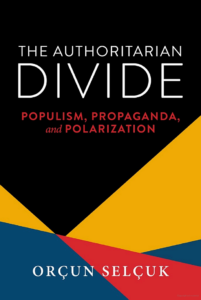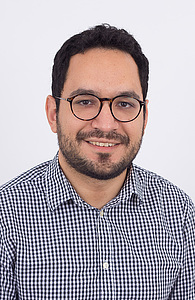
The cover for “The Authoritarian Divide: Populism, Propaganda, and Polarization” by Orçun Selçuk.
DECORAH, IOWA—Orçun Selçuk, assistant professor of political science at Luther College, recently published “The Authoritarian Divide: Populism, Propaganda, and Polarization,” which examines the relationship between populism and polarization through leaders in Turkey, Venezuela, and Ecuador.
“The book makes the argument that in this age of personalization of politics, which means politics is more about personalities rather than policy, that politics becomes a televised spectacle and policies center around a leader’s persona,” Selçuk said. “This kind of polarization diminishes democracy.”
The three populist leaders studied in this book are Recep Tayyip Erdoğan, the president of Turkey; Hugo Chávez, the former president of Venezuela; and Rafael Correa, the former president of Ecuador. The book examines both leftwing and rightwing populism, as Chávez and Correa were both leftwing leaders and Erdoğan represents the right.
“The book is about pro- and anti-leader groups in the three countries,” Selçuk said. “The interesting and important part is these are almost equally sizable groups in each society, and these groups often don’t interact with one another. This creates polarization around the leader.”
He wrote “The Authoritarian Divide” because there are not many books that examine the relationship between populism and polarization.
“There are books about populism and there are books about polarization, but there are few books that examine how the two concepts interconnect,” Selçuk said.
His book is also different because it doesn’t focus on one region, but looks at three different countries on two different continents. The research shows how populist leaders can divide citizens in different contexts, showcasing both similarities and differences in how populism can polarize.
Selçuk examined the leaders by studying public speeches and television appearances. In Ecuador and Venezuela, Correa and Chávez would host weekly television programs that were analyzed for the book.
Selçuk found that populist leaders include their supporters and exclude their opponents. In public speeches, one can find inclusion or exclusion, depending on their pro or anti-group identity.

Orçun Selçuk
“The reason why people are polarized over these leaders is not because they’re ideologically on the extreme, but mainly because they create this dichotomy of insiders versus outsiders within the groups,” Selçuk said. “Polarization is about populist leaders, not issues.”
The book also examines solutions on how to rebuild democracy in the face of its decline in different contexts. Selçuk’s primary research focus is the decline of democracy in Turkey and Latin America. Before publishing this book, he published numerous articles on the subject.
The book is a culmination of more than five years of work. The concept of the book was developed from Selçuk’s Ph.D. dissertation on the three populist leaders. While his dissertation was a starting point, his book provides a different perspective on the relationship between populism and polarization.
For his book, Selçuk also had Luther students assist with the research. Salomé Valdivieso Santillán, who graduated from Luther in 2023 and served as a Global Learning Fellow at Luther, transcribed and decoded Correa’s television program and speeches as an undergraduate student. She watched and transcribed more than 900 hours of Correa’s weekly television show.
“I would watch the three-hour-long shows that Correa hosted and transcribe them for the book,” Valdivieso said. “For decoding, I would assign the former president’s rhetoric into categories such as symbolic, political, and material inclusion or exclusion.”
This taught Valdivieso Santillán important research skills as an undergraduate student, as well as the process of publishing an academic book.
In September, Selçuk will present his book at the American Political Science Association’s “Author Meets Critics” panel in Philadelphia. The event will feature six scholars of comparative political science in addition to Selçuk to discuss the book. The book is available to purchase through the University of Notre Dame Press.
“I want people to understand that populist leaders provide a sense of belonging to their supporters while antagonizing their opponents. Depending on our feelings of being included or excluded, citizens position themselves for or against the populist leader,” Selçuk said. “To overcome polarization, it is important to recognize the affective appeal of populism instead of dismissing the supporters as manipulated and ignorant masses. Populist leaders are on the rise globally, and we live in a world where polarization undermines the social fabric and democratic norms.”
About Luther College
At Luther College in beautiful Decorah, Iowa, students explore big questions and take action to benefit people, communities and society. Our academic programs, experiential approach to learning and welcoming community inspire students to learn actively, live purposefully and lead courageously for a lifetime of impact. Learn more at luther.edu.









